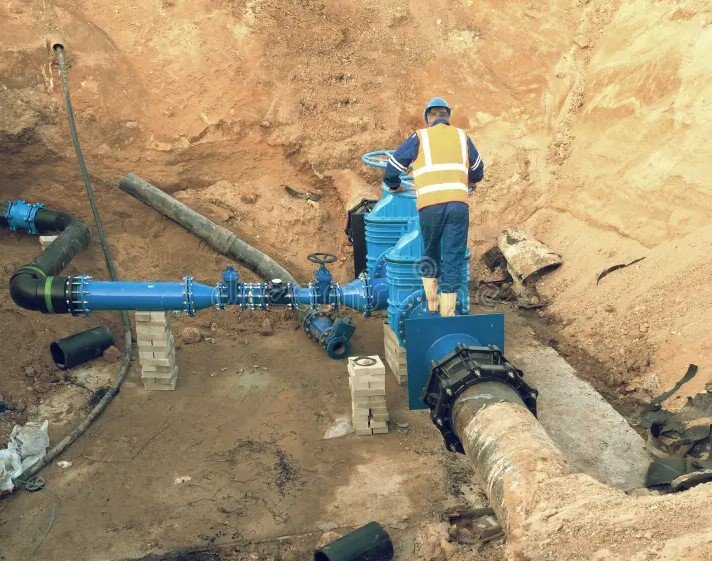Saudi Water Partnership Company has received three bids for the Riyadh Qassim Independent Water Transmission Pipeline Project, a major step in boosting water supply across central Saudi Arabia. Announced on September 17, 2025, this development aims to enhance infrastructure and ensure reliable drinking water for millions in Riyadh and Al Qassim regions.
Project Overview and Goals
The Riyadh Qassim pipeline project focuses on creating a robust water transmission system to meet growing demands in Saudi Arabia. It aligns with the nation’s Vision 2030 plan, which emphasizes sustainable water resources and infrastructure upgrades.
This initiative comes at a time when Saudi Arabia is investing heavily in water projects to combat scarcity and support urban growth. The pipeline will connect key areas, promoting efficient water distribution and reducing reliance on less sustainable sources.
Officials expect the project to start commercial operations in the first quarter of 2030, with a 35 year concession period under a build, own, operate, and transfer model. This approach encourages private sector involvement to speed up development and share risks.

Bidding Process and Participants
The bidding process drew strong interest, with 31 companies expressing initial interest, including 19 from Saudi Arabia. This highlights the project’s appeal and the competitive landscape in the region’s infrastructure sector.
Three consortiums submitted final bids, showcasing a mix of local and international expertise. These groups bring experience in water management, construction, and energy solutions, which could ensure high quality execution.
- Al Jomaih Energy and Water Co. Ltd, Alkhorayef Water and Power Technologies, Al Bawani Capital Company, and Buhur for Investment Company form one consortium.
- Lamar Holding, Etihad Water and Electricity Company, and Shaanxi Construction Engineering Group Corporation Limited make up the second group.
- Vision International Investment Company stands as the third bidder.
The Saudi Water Partnership Company will now evaluate these proposals based on technical merits, financial viability, and alignment with national goals. A winner is expected to be announced soon, following a thorough review process.
Recent trends show Saudi Arabia attracting more foreign investments in utilities, with similar projects like the Jubail Buraydah pipeline securing deals worth billions earlier this year.
Technical Details and Innovations
The pipeline will span 859 kilometers and carry up to 685,000 cubic meters of water per day. It includes bi directional flow capabilities, allowing flexible water movement between regions.
To support operations, the project features extensive storage solutions. Six strategic tanks in Riyadh will hold 1,020,000 cubic meters, while 32 operational tanks along the route add another 571,000 cubic meters.
Innovation plays a key role, with integrated solar power to cut carbon emissions and grid electricity for reliability. This blend supports Saudi Arabia’s push toward green energy in infrastructure.
| Feature | Details |
|---|---|
| Length | 859 kilometers |
| Daily Capacity | 685,000 cubic meters |
| Storage in Riyadh | 1,020,000 cubic meters (6 tanks) |
| Route Storage | 571,000 cubic meters (32 tanks) |
| Operation Start | Q1 2030 |
| Model | Build, own, operate, transfer (35 years) |
These elements ensure the system can handle peak demands and emergencies, making it a model for future water projects in arid regions.
Strategic Importance for Saudi Arabia
This pipeline is part of a broader strategy by the Ministry of Environment, Water and Agriculture to interconnect water systems nationwide. It addresses challenges like population growth and climate change, which strain existing resources.
By linking Riyadh and Al Qassim, the project will supply drinking water to urban centers and support agriculture, a vital sector in the kingdom. Experts predict it could serve millions, improving quality of life and economic stability.
Compared to past efforts, such as the Rayis Rabigh pipeline that began receiving bids in 2023, this one scales up capacity and incorporates modern tech. It also ties into recent successes, like the Jubail Buraydah deals signed in 2025 for over 2 billion dollars.
The emphasis on sustainability, including solar integration, reflects global trends toward eco friendly infrastructure. Saudi Arabia’s investments in such projects have grown by 15 percent annually since 2020, according to industry reports.
Future Implications and Challenges
Looking ahead, the Riyadh Qassim project could set precedents for public private partnerships in the Middle East. Successful implementation might inspire similar ventures in neighboring countries facing water shortages.
However, challenges remain, such as ensuring timely construction amid supply chain issues and maintaining environmental standards. Stakeholders will need to monitor progress closely to avoid delays seen in some earlier regional projects.
Overall, this bid reception marks progress toward a more resilient water network, potentially influencing policy and investment in the sector for years to come.
What do you think about this project’s impact on Saudi Arabia’s water security? Share your thoughts in the comments and spread the word to keep the conversation going.
